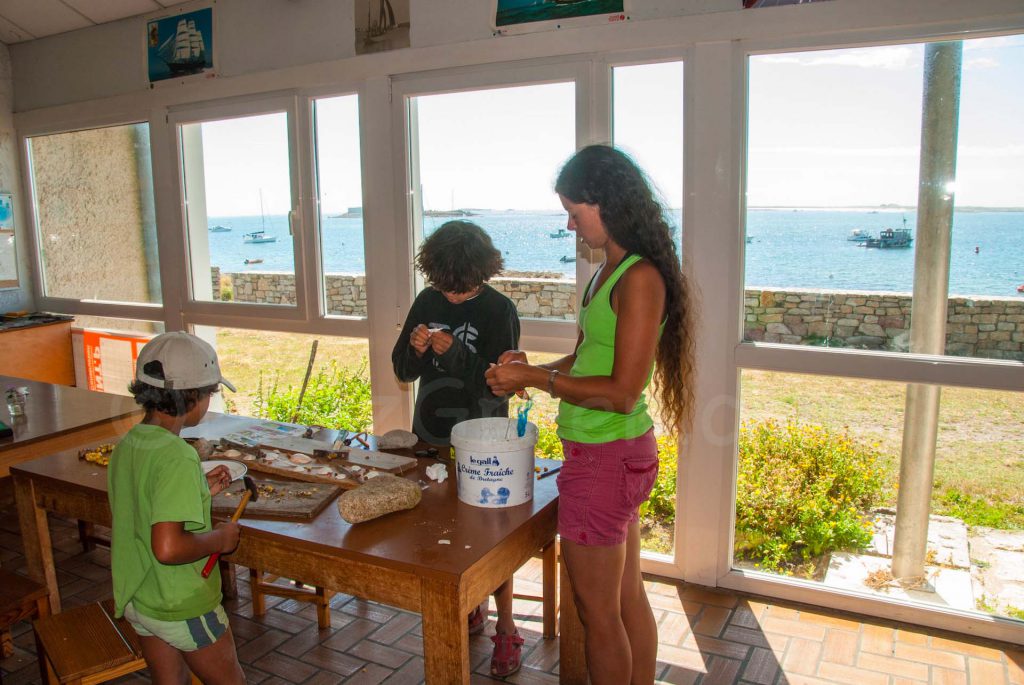Managed by an association, the collective sea shelter is perfect for reconnecting with nature
But staying in this beautiful nature sanctuary is not so easy. It is a privilege that has long been reserved for boaters until the Sextant opens its doors. Kind of sea shelter, the Sextant is the only hostel open to the public to stay in the archipelago where camping and campfires are prohibited. The marine site has been integrated into the Natura 2000 network in order to preserve its rare and fragile fauna and flora and their habitats.
Originally built to accommodate boating groups, the structure was taken over by a dozen volunteers who share the desire to make the archipelago more accessible to the public. ‘To take advantage of this exceptional place and live in harmony with nature, we must first respect it,’ says Dominique Moal who is an active member of the association, ‘this is why we have opted for a sea shelter, simple and spartan in order to consume a minimum of water and energy.’
If residents appreciate the stunning views of the sea, they also need to get used to pump cold water to use dry toilets and must also be willing to share their room. Families, groups and individuals are welcome provided they respect the island lifestyle and atmosphere ‘hostel’ places.
A unique meeting place for sea lovers
The accommodation features a spacious common living room with a kitchen area and a dining room that overlooks the sea. Residents can cook and eat together or separately, as they wish. An imposing barbecue was even built in the garden by the team of volunteers who manage maintenance of the premises during the off season. From paintings to the installation of solar showers, through the repair of gutters or repair the wall, each one puts his hand to the dough in the joy and good humor! A great opportunity for these lads to enjoy the serenity of the archipelago with friends. ‘Our goal is to offer functional accommodations while maintaining a rustic ambiance,’ explains Jean-Paul Cap, volunteer member of the association, ‘we want to ensure that visitors find the contact with nature and discover the Glenan in harmony with the natural elements.’
A relaxing stay in harmony with nature
Here, only the roar of the pebbles on the beach, the cry of seagulls and the blades of wind turbines disturb the silence… A silence that is very precious for the few islanders who wish to spend a long time in this ‘comfort’…
For most guests of Sextant the rusticity is offset by the proximity of this extraordinary marine site. As for collective organization, it tends to facilitate the communication. ‘It is not uncommon to see visitors who do not know each other, sharing their meal or the catch of the day…’ completes Jean Paul Cap who comes three weeks each summer to run the structure. This is a boon for holidaymakers looking to experience the quintessential Glénan. Members like Jean Paul enjoys sharing their stories, anecdotes, discoveries, or their fishing spots if affinity… Ideally located on the seafront with stunning views of the inner lagoon of Archipelago, the cottage is a unique meeting place between sea lovers and water sports enthusiasts. Beyond fishing, diving, snorkeling or exploring the foreshore, activities abound to enjoy the archipelago.
Manage consumption as a boat
Visitors are also aware of the constraints of island life. Upon arrival, they are briefed: waste must be sorted and if possible brought to the continent when to water and energy, we must learn to use them sparingly. In addition to being cold, the water must be pumped and is totally undrinkable. Dry toilets and solar showers are nevertheless made available to residents. And height of luxury, mirrors are installed in the toilet block! ‘Although the cottage works well and, of evolution projects are still being studied to meet the standards more demanding regarding the management of waste water, production of hot water and implantation modern toilets,’ says with some regret Dominique Moal, anxious to find the right balance between accessibility of the archipelago and its preservation for future generations.




